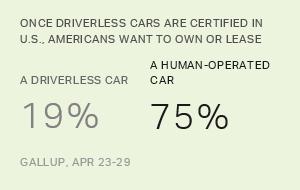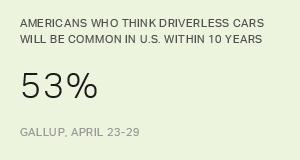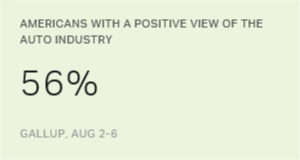Story Highlights
- 83% of U.S. adults drive a car at least several times a week
- 34% enjoy driving "a great deal"; 44% "a moderate amount"
- Men drive more regularly than women and enjoy it more
WASHINGTON, D.C. -- Nearly all U.S. adults regularly drive a car or other vehicle, with 83% reporting they do so personally at least several times a week. This includes 64% who say they drive every day and 19% who do so most days in a week. Six percent of Americans drive a few times a month, 4% rarely drive and 6% never do. The most frequent drivers are men, adults with household incomes of $90,000 per year or more, college graduates, suburbanites, parents of children under 18, and those between 30 and 49 years of age.
| Every day | Most days | Few times a month/Rarely/Never | |||||||||||||||||||||||||||||||||||||||||||||||||||||||||||||||||||||||||||||||||||||||||||||||||
|---|---|---|---|---|---|---|---|---|---|---|---|---|---|---|---|---|---|---|---|---|---|---|---|---|---|---|---|---|---|---|---|---|---|---|---|---|---|---|---|---|---|---|---|---|---|---|---|---|---|---|---|---|---|---|---|---|---|---|---|---|---|---|---|---|---|---|---|---|---|---|---|---|---|---|---|---|---|---|---|---|---|---|---|---|---|---|---|---|---|---|---|---|---|---|---|---|---|---|---|
| % | % | % | |||||||||||||||||||||||||||||||||||||||||||||||||||||||||||||||||||||||||||||||||||||||||||||||||
| U.S. adults | 64 | 19 | 16 | ||||||||||||||||||||||||||||||||||||||||||||||||||||||||||||||||||||||||||||||||||||||||||||||||
| Men | 69 | 17 | 14 | ||||||||||||||||||||||||||||||||||||||||||||||||||||||||||||||||||||||||||||||||||||||||||||||||
| Women | 59 | 22 | 18 | ||||||||||||||||||||||||||||||||||||||||||||||||||||||||||||||||||||||||||||||||||||||||||||||||
| City residents | 61 | 19 | 19 | ||||||||||||||||||||||||||||||||||||||||||||||||||||||||||||||||||||||||||||||||||||||||||||||||
| Suburban residents | 72 | 18 | 10 | ||||||||||||||||||||||||||||||||||||||||||||||||||||||||||||||||||||||||||||||||||||||||||||||||
| Town/Rural residents | 63 | 21 | 17 | ||||||||||||||||||||||||||||||||||||||||||||||||||||||||||||||||||||||||||||||||||||||||||||||||
| 18-29 | 62 | 18 | 20 | ||||||||||||||||||||||||||||||||||||||||||||||||||||||||||||||||||||||||||||||||||||||||||||||||
| 30-49 | 76 | 12 | 12 | ||||||||||||||||||||||||||||||||||||||||||||||||||||||||||||||||||||||||||||||||||||||||||||||||
| 50-64 | 68 | 20 | 13 | ||||||||||||||||||||||||||||||||||||||||||||||||||||||||||||||||||||||||||||||||||||||||||||||||
| 65+ | 45 | 32 | 23 | ||||||||||||||||||||||||||||||||||||||||||||||||||||||||||||||||||||||||||||||||||||||||||||||||
| Have children under 18 | 78 | 11 | 11 | ||||||||||||||||||||||||||||||||||||||||||||||||||||||||||||||||||||||||||||||||||||||||||||||||
| Don't have children under 18 | 59 | 23 | 17 | ||||||||||||||||||||||||||||||||||||||||||||||||||||||||||||||||||||||||||||||||||||||||||||||||
| Less than $36,000/year | 46 | 27 | 27 | ||||||||||||||||||||||||||||||||||||||||||||||||||||||||||||||||||||||||||||||||||||||||||||||||
| $36,000 to <$90,000/year | 68 | 20 | 12 | ||||||||||||||||||||||||||||||||||||||||||||||||||||||||||||||||||||||||||||||||||||||||||||||||
| $90,000 or more per year | 82 | 12 | 6 | ||||||||||||||||||||||||||||||||||||||||||||||||||||||||||||||||||||||||||||||||||||||||||||||||
| College graduate | 74 | 18 | 9 | ||||||||||||||||||||||||||||||||||||||||||||||||||||||||||||||||||||||||||||||||||||||||||||||||
| Not college graduate | 60 | 20 | 19 | ||||||||||||||||||||||||||||||||||||||||||||||||||||||||||||||||||||||||||||||||||||||||||||||||
| GALLUP, April 23-29, 2018 | |||||||||||||||||||||||||||||||||||||||||||||||||||||||||||||||||||||||||||||||||||||||||||||||||||
These findings are from an April 23-29 Gallup poll that explored Americans' driving habits and their attitudes toward cars as technological innovations change the auto industry and as alternatives to the traditional paradigm of car ownership are emerging. Among other advances, driverless cars and ride-sharing services could disrupt the auto industry. The poll found that 86% of U.S. adults say they own or lease a car or other vehicle.
Men are more likely than women to say they drive every day, 69% vs. 59%, respectively. Likewise, 78% of parents of children younger than 18 are daily drivers, versus 59% of those without younger children. Suburbanites (72%) are more likely than city dwellers (61%) and those in rural areas (63%) to drive on a daily basis.
Among those least likely to drive every day are adults aged 65 and older (45%) and those with annual incomes less than $36,000 (46%). Older adults may be retired, have fewer activities or medical reasons for driving less often. Adults from households with lower incomes may not own a car, may not have a job or may be cautious about how often they need to fill up their gas tank, making their ability or need to drive less frequent. Still, majorities of both groups drive at least most days in a week, and only about one-quarter of each group drives a few times a month, rarely or never.
One in Three Americans Enjoy Driving a Great Deal
Although most Americans are spending time every day in their cars, they aren't overly enthusiastic about driving, as 34% say they enjoy driving "a great deal." Still, 44% say they enjoy being behind the wheel "a moderate amount," while just 13% say they don't enjoy it much and 8% not at all.
Daily drivers are split over how much they enjoy driving, with 41% saying they enjoy it a great deal and 45% a moderate amount. Meanwhile, those who drive several times a week are less likely to say they enjoy it a great deal (26%) compared with a moderate amount (54%). Among those who drive even less often, 16% enjoy it a great deal and 26% a moderate amount, which could explain why they drive infrequently.
Men -- who are more likely than women to report driving frequently -- are also more likely to find driving highly enjoyable, 41% vs. 27%, respectively. Women younger than 50 are less likely than women 50 and older to say they enjoy driving a great deal.
| A great deal | A moderate amount | Not much/Not at all | |||||||||||||||||||||||||||||||||||||||||||||||||||||||||||||||||||||||||||||||||||||||||||||||||
|---|---|---|---|---|---|---|---|---|---|---|---|---|---|---|---|---|---|---|---|---|---|---|---|---|---|---|---|---|---|---|---|---|---|---|---|---|---|---|---|---|---|---|---|---|---|---|---|---|---|---|---|---|---|---|---|---|---|---|---|---|---|---|---|---|---|---|---|---|---|---|---|---|---|---|---|---|---|---|---|---|---|---|---|---|---|---|---|---|---|---|---|---|---|---|---|---|---|---|---|
| % | % | % | |||||||||||||||||||||||||||||||||||||||||||||||||||||||||||||||||||||||||||||||||||||||||||||||||
| U.S. adults | 34 | 44 | 22 | ||||||||||||||||||||||||||||||||||||||||||||||||||||||||||||||||||||||||||||||||||||||||||||||||
| Men | 41 | 40 | 18 | ||||||||||||||||||||||||||||||||||||||||||||||||||||||||||||||||||||||||||||||||||||||||||||||||
| Women | 27 | 48 | 24 | ||||||||||||||||||||||||||||||||||||||||||||||||||||||||||||||||||||||||||||||||||||||||||||||||
| 18-29 | 37 | 47 | 15 | ||||||||||||||||||||||||||||||||||||||||||||||||||||||||||||||||||||||||||||||||||||||||||||||||
| 30-49 | 30 | 46 | 24 | ||||||||||||||||||||||||||||||||||||||||||||||||||||||||||||||||||||||||||||||||||||||||||||||||
| 50-64 | 39 | 41 | 21 | ||||||||||||||||||||||||||||||||||||||||||||||||||||||||||||||||||||||||||||||||||||||||||||||||
| 65+ | 32 | 40 | 26 | ||||||||||||||||||||||||||||||||||||||||||||||||||||||||||||||||||||||||||||||||||||||||||||||||
| Men 18-49 | 42 | 41 | 17 | ||||||||||||||||||||||||||||||||||||||||||||||||||||||||||||||||||||||||||||||||||||||||||||||||
| Women 18-49 | 23 | 52 | 23 | ||||||||||||||||||||||||||||||||||||||||||||||||||||||||||||||||||||||||||||||||||||||||||||||||
| Men 50+ | 41 | 38 | 20 | ||||||||||||||||||||||||||||||||||||||||||||||||||||||||||||||||||||||||||||||||||||||||||||||||
| Women 50+ | 31 | 42 | 25 | ||||||||||||||||||||||||||||||||||||||||||||||||||||||||||||||||||||||||||||||||||||||||||||||||
| City residents | 36 | 38 | 24 | ||||||||||||||||||||||||||||||||||||||||||||||||||||||||||||||||||||||||||||||||||||||||||||||||
| Suburban residents | 33 | 50 | 17 | ||||||||||||||||||||||||||||||||||||||||||||||||||||||||||||||||||||||||||||||||||||||||||||||||
| Town/Rural residents | 32 | 47 | 21 | ||||||||||||||||||||||||||||||||||||||||||||||||||||||||||||||||||||||||||||||||||||||||||||||||
| Drive daily | 41 | 45 | 13 | ||||||||||||||||||||||||||||||||||||||||||||||||||||||||||||||||||||||||||||||||||||||||||||||||
| Drive several times a week | 26 | 54 | 20 | ||||||||||||||||||||||||||||||||||||||||||||||||||||||||||||||||||||||||||||||||||||||||||||||||
| Drive less often | 16 | 26 | 53 | ||||||||||||||||||||||||||||||||||||||||||||||||||||||||||||||||||||||||||||||||||||||||||||||||
| GALLUP, April 23-29, 2018 | |||||||||||||||||||||||||||||||||||||||||||||||||||||||||||||||||||||||||||||||||||||||||||||||||||
Bottom Line
Americans' dependence on cars appears deeply entrenched, with more than eight in 10 U.S. adults reporting that they personally drive at least most days in a week and nearly two-thirds driving every day. While most Americans enjoy driving at least a moderate amount, far fewer say they enjoy it a great deal.
As the auto industry undergoes big changes with the adoption of everything from hybrid cars to electric cars to driverless cars, automakers are well-advised to understand the demand for cars, who gets the most pleasure from driving, and how to cater to these drivers and to those who do not enjoy driving as much. For instance, women, older adults and those in lower-income brackets are potentially prime users of driverless cars.
Survey Methods
Results for this Gallup poll are based on telephone interviews conducted April 23-29, 2018, on the Gallup U.S. Poll with a random sample of 1,503 adults, aged 18 and older, living in all 50 U.S. states and the District of Columbia. For results based on the total sample of national adults, the margin of sampling error is ±3 percentage points at the 95% confidence level. All reported margins of sampling error include computed design effects for weighting.
Each sample of national adults includes a minimum quota of 70% cellphone respondents and 30% landline respondents, with additional minimum quotas by time zone within region. Landline and cellular telephone numbers are selected using random-digit-dial methods.
Learn more about how the Gallup U.S. Poll works.




